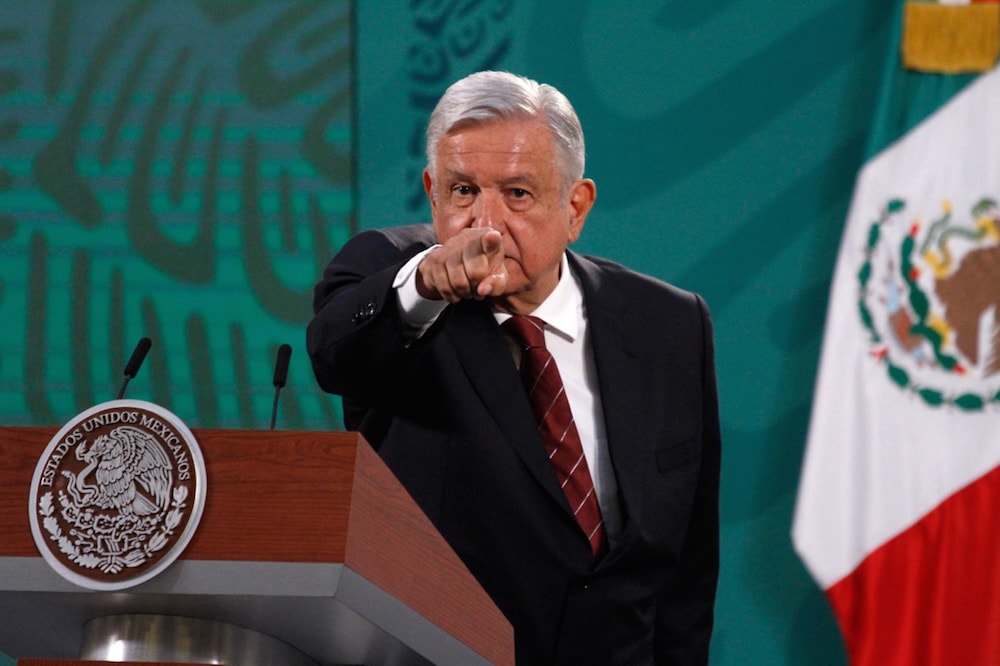March 2021 in the Americas: A free expression round up produced by IFEX's Regional Editor Paula Martins, based on IFEX member reports and news from the region.
President Obrador attacks ARTICLE 19 after release of critical report
In March, ARTICLE 19 Mexico and Central America released its annual report – Distorsión, examining the overall situation of freedom of expression and information in Mexico in 2020
The news is not good. According to the report, media attacks increased by 13.63% compared to the previous year, with a total of 692 recorded. Of the assaults on journalists, 49.5% were perpetrated by state agents (public civil service personnel, civil security forces and armed forces). That represents an increase of 29.4% as compared with 2019. The most common assaults on the press by state agents referred to the “illegitimate use of public authority”. A great number of assaults came specifically from civilian security forces: 144 out of the 343 carried out by public authorities (41.98%). The exponential increase in acts categorized by ARTICLE 19 as “illegitimate use of public authority” is striking. Registered acts of administrative and judicial harassment went from 11 in 2019 to 33 in 2020. In other words, the use of the ‘power apparatus’ to frighten or silence critical voices tripled in just one year.
The report also analyses unequal access to information in the country during the pandemic, the dismantling of institutions with human rights competences – such as the Executive Commission on Victim Care (CEAV), the Protection Mechanism for Human Rights Defenders and Journalists, the access to public information and data protection authority (INAI) and the National Human Rights Commission (CNDH) – as well as attempts by Congress to regulate the internet.
In relation to this last point, ARTICLE 19 monitored 12 bills presented to the federal and provincial legislative houses, “all with serous technical deficiencies that demonstrate lack of understanding about the functioning of the Internet”, but all seeking to impose serious control over it, through the adoption of regulations on intermediary liability, online media, and intervention in digital markets.
[Translation: #Distortion, the discourse against reality, we highlight how the “other data” have become a tool of disinformation, especially on topics related to human rights. Find out more on: https://distorsion.articulo19.org]
After the publication of the report, Mexico’s President Andres Manuel López Obrador attacked ARTICLE 19 staff during his morning daily press conference, claiming that the organization’s staff was part of a ‘conservative movement’ waging a campaign against him.
Hundreds of organizations and activists expressed support and solidarity with the NGO, including the current and two previous Inter-American Commission on Human Rights Special Rapporteurs on Freedom of Expression.
[Translation: I wish to express my deep disagreement and concern with the statements made by Mexico’s president against the organization @article19mex . I share some reasons.]
No Excuse for Abuse!
“[I]n an industry that has boasted of its willingness to “move fast and break things,” efforts to protect vulnerable users are just not moving fast enough.” PEN America
PEN America launched a new report in March, looking at online abuse against writers and journalists. Noting that certain groups are disproportionately targeted for their identity and profession, in No Excuse for Abuse: What Social Media Companies Can Do Now to Combat Online Harassment and Empower Users, PEN proposes concrete, actionable changes that social media companies should make to the design of their platforms. These measures aim to find the difficult balance between online safety and free expression.
PEN calls attention to the fact that the negative impacts of online abuse range from those on mental and physical health to, in extreme cases, escalation to physical violence and even murder. Individuals at the intersection of multiple identities, especially women of colour, experience the most abuse. The report criticizes the internet platforms’ lack of action despite numerous campaigns demonstrating the gravity of the situation.
Jineth Bedoya offered ‘dialogue’ rather than justice
15 March 2021 marked the first day of the long-awaited hearing of Jineth Bedoya’s case before the Inter-American Court of Human Rights, part of the process to determine the Colombian state’s responsibility for the acts of threat, abduction, torture and sexual violence faced by the journalist in 2000.
However, shortly after the hearing began the Colombian National Legal Defense Agency, headed by Camilo Gómez, alleged a lack of impartiality on the part of most of the judges and the president of the Court, citing the solidarity they showed after Bedoya’s testimony. It announced that it would file a ‘recusal petition’ against five of the six judges, due to an alleged lack of procedural safeguards. The state made the decision to withdraw from the hearing.
Gómez also posted a letter on Twitter addressed to Bedoya inviting her to sit down to “dialogue” and seek “an amicable solution”, which the journalist considered an attempt to silence her.
[Translation: As a Colombian and as a representative of the Colombian state, I do not wish to see the procedural problems continuing to delay the reaching of a resolution in this case. I propose to @jbedoyalima that we sit down to dialogue and search for an amicable solution, actions which are permitted according to the Court’s regulations.]
This behaviour sparked a very strong response. IFEX Colombian member Fundación para la Libertad de Prensa (FLIP) and the Center for Justice and International Law (CEJIL), which represented Bedoya in the hearing, affirmed that “the attitude of the State demonstrates negligence against the victims of sexual violence in the armed conflict and denies dignified spaces to access justice.”
Such a withdrawal is unprecedented, and raises concerns about the Colombian state’s commitment to trials for human rights violations and submission to the Court’s decision. The Committee to Protect Journalists (CPJ) called it “a slap in the face to every Colombian journalist – especially women journalists – fighting impunity.”
On 22 March the hearing resumed, and was concluded the following day. On 24 March the Inter-American Court issued a resolution granting provisional measures aimed at requiring Colombia to safeguard Bedoya’s “life and personal integrity.”
[Translation: Adoption of #MedidasProvisionales in the Case of Bedoya Lima and another v. Colombia. The Inter-American Court of Human Rights has issued an order to adopt provisional measures in the Case of Bedoya Lima and another v. Colombia.]
Freedom in decay and a forest in flames
IFEX member ARTIGO 19 Brasil has released the first edition of a new magazine. In it, leading journalists and human rights defenders comment on the results of the Global Expression Report ARTICLE 19 International released in late 2020. The report covers 3.9 billion people living in countries where the guarantee of this right is in crisis. Of all the analyses made, Brazil showed the most significant decrease in the freedom of expression indicator. Also, according to the report, the decline accelerated with the arrival of Bolsonaro to the presidency of the Republic, with a drop of 28% in just one year.
According to ARTIGO 19 Executive Director Denise Dora:
“There are about 200 million people in Brazil who have fewer freedoms year by year: to express themselves, to create artistically, to protest and to write without fear of censorship.”
One of the magazine’s contributors, Katia Brasil, director and co-founder of a website dedicated to covering news from the Brazilian Amazon region, stated that, under Bolsonaro, anti-Amazonian, anti-environmental, and anti-human rights policies have aggravated the situation of ‘communicators’ who defend rights in the country. “We continue to do our work as journalists, covering the Amazon region and communities, but of course, in a much more difficult and challenging context,” she said.
She also calls attention to the fact that much of the investigative journalism in the region is done by people with no formal education or diploma in the area. This has led many organizations working on press freedom issues to ignore their work and the violations they suffer. The situation is changing, but there is still little coverage of or attention to a type of journalism that, according to her, mainstream media outlets are not willing to do.
She adds that these communicators “are the ones being murdered. One must look at such a diverse and unequal [country] as ours and see that we also have a lot of inequality in the communication sector, inequality between the position of journalists and communicators.”
How’s it going, eh? Privacy in Canada
The Canadian government is looking at making changes to the laws that govern how federal departments and agencies can use personal information. IFEX Canadian member OpenMedia has submitted to the Department of Justice the results of a survey that collected the public’s views in relation to such reforms.

OpenMedia
According to OpenMedia, “This survey was based on one made available through the Department of Justice, but different in that it was less than half as long, featured some new questions on potential improvements to the Act we felt the government had left out, and tweaked a few questions we thought had problematic or misleading phrasing.”
Results pointed to the need for greater oversight and accountability; the need for enhanced transparency, and limits on sharing of data without consent; and the importance to ‘future proof’ privacy legislation for emerging technologies, like artificial intelligence.
The Department of Justice will now take all the feedback provided during the consultations and work towards drafting legislation to modernize the Canadian Privacy Act. OpenMedia will continue advocating to ensure the public’s concerns are addressed in the reform.
And in Argentina…
IFEX member Asociación por los Derechos Civiles (ADC), released an analysis of ‘hot issues’ in relation to privacy that should call for the Argentinian public’s attention in the months to come. Their analysis is organized around 10 news highlights:
- Ransomware attacks are at a peak
- Surveillance through facial recognition is expanding
- Vulnerabilities have been reported in relation to the national digital ID (Documento Nacional de Identidad – DNI)
- More applications have been developed in the fight against COVID-19
- Cyber-patrolling (cyberpatrullaje) continues to be used to monitor social media
- The relationship between the national government and research and surveillance technology companies has been strengthened
- The digitization of health continues to increase
- Data from children and teenagers subjected to criminal investigations are published online
- Abortion has been legalized in Argentina
- Another scandal has been reported in relation to the nation’s intelligence system
Learn more about how all this will impact privacy in Argentina, here.
AI and human rights under the microsocope
IFEX-ALC member Derechos Digitales is launching a new research project that assesses the use of artificial intelligence in public policies. The group’s concern is that, without human rights guidelines, AI projects and applications by governments can have irreparable negative consequences.
As part of the project, they reviewed four case studies, each of which provides: an overview of the national context in which the implementation of the artificial intelligence system took place; the regulatory and institutional context of its implementation; the data infrastructure involved; the decision-making process associated with the implementation; and the technological design of the system used.
The cases are: Brazil’s National Employment System to facilitate the relocation of unemployed professionals in the labour market; Chile’s Children’s Alert System, which seeks to estimate and predict the level of risk of children and adolescents from suffering any violation of their rights in the future; Colombia’s PretorIA tool, used by the Constitutional Court to make the process of selecting cases of judicial protection of fundamental rights more efficient; and Uruguay’s Coronavirus UY, a free mobile app. You can read more about the project and the case studies here.
In Brief
- Venezuela: Between January and March 2021, IPYS Venezuela registered 14 cases of “discursive and stigmatizing attacks” against journalists, media outlets, and civil society organisations after they published public interest information or generated complaints on their online accounts or platforms. IPYS reports that this has triggered international bodies such as the UN High Commissioner for Human Rights, the Independent International Fact-Finding Mission on Venezuela, the IACHR and its Special Rapporteur on Freedom of Expression (RELE), to warn about the shrinking of democratic spaces in Venezuela and call for the cessation of persecution and intimidation of activists.
- Peru: On 29 March, journalist Carlos Alberto Tafur received a death threat after reporting on local corruption.
- Bolivia: Several known journalists were targeted by a disinformation campaign and accused of benefiting from irregular consultancy agreements with the former presidency.
- Brazil: A Brazilian court has ordered President Bolsonaro to pay compensation to journalist Patricia Campos Mello after he suggested last year that she had offered sex to a source for negative information about him.
- Venezuela: Facebook blocked President Maduro for violating its rules on coronavirus ‘fake news’, after his release of a promotional video about a “miraculous” remedy that would supposedly neutralize the coronavirus
- Paraguay: During March, protesters in Paraguay demanded that President Benítez resign or be removed from office due to his handling of the Covid-19 pandemic. Protestors also say that the governing party’s more than 70 years of almost uninterrupted power has resulted in deep inequalities, endemic corruption, and inefficient institutions.



